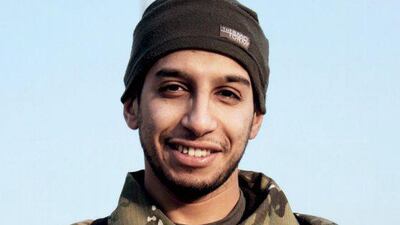The murderous Abedi brothers were inspired by an ISIS-linked group of extremists as they prepared to attack a pop concert in the city where they were born. Hashem Abedi is believed to have created and used an email address - bedab7jeanagmail.com - that was inspired by the Arabic slogan “through slaughter we have come”. The email account was used to purchase chemical components for the bomb.
The slogan was chosen by the Syrian-based armed group Katibat Al Battar Al Libi when it formed in 2012 and was well-known among militants in North Africa. Handwritten scraps of paper bearing the email address were found in a bin at the Manchester home of the brothers following the attack on the Manchester Arena where 22 people were killed by a bomb detonated by Salman Abedi.
Katibat Al Battar Al Libi was an extremist group with a predominantly Libyan membership but also comprised of other North Africans and Europeans who headed to Syria in the wake of the Arab uprisings.
The email address hinted at the source of influence on the brothers but a limited amount of phone and communications data has been available to the investigators, meaning it was impossible to trace potential key figures in Libya behind their radicalisation. Both brothers are known to have travelled to Libya to join the uprising against Col Muammar Qaddafi. Decades earlier their father was a member of the Libyan Islamic Fighting Group (LIFG) that was proscribed by the British government as a terrorist group until last year.
“They spent a great deal of time in Libya,” said Detective Chief Superintendent Simon Barraclough, the senior officer in charge of the investigation. “Since before Qaddafi fell, there’s a great deal of radicalism out there and a great deal of support for ISIS ideology.

“It would not be unreasonable to make at least some assumption that they have contacts out there and had some people who influenced them in Libya.”
Police assess that Salman Abedi had shown some expertise in avoiding identification after he returned to Manchester to detonate the bomb: “Whoever has radicalised this man, or been instrumental in that instruction, has clearly imparted some trade craft as well,” Chief Supt Barraclough said.
Large groups of fighters from the eastern Libyan city of Derna, a place with a history of militancy, were among the first foreigners to arrive in Syria in 2012 to form Katibat Al Battar Al Libi, according to the Small Arms Survey, a specialist monitoring group. The group would eventually side with ISIS. Members were reportedly divided into three roles: guarding senior ISIS leaders, assassinating rivals, and mass casualty attacks.
Salman once met with figures from the brigade in the capital Tripoli, a city dominated by armed factions, and the migrant smuggling town of Sabratha to the west, where ISIS once had a presence, according to The New York Times which cited US security sources.
ISIS’s Libya branch in 2015 seized the central coastal city of Sirte, the former hometown of deceased leader Muammar Qaddafi, and controlled a swathe of territory second only in size to its footprint in Syria and Iraq.
Hundreds of Libyan members of Katibat Al Battar Al Libi - “an elite unit of shock troops and trainers” - returned home in late 2015 as ISIS began to claim territory during civil war in the oil-rich North African country, said terrorism researcher Kyle Orton.
The group also helped direct attacks abroad. Its alumni included some of Europe’s most infamous terrorists, including Abdelhamid Abaaoud, the Belgian who was reputed to be the ringleader in the 2015 attacks in Paris that killed 130 people.

